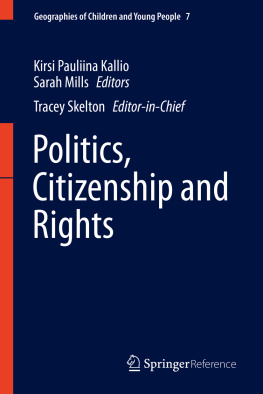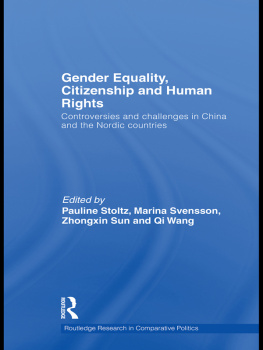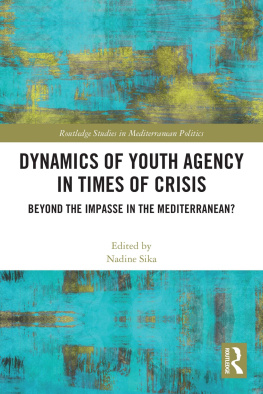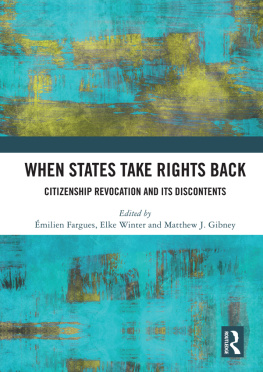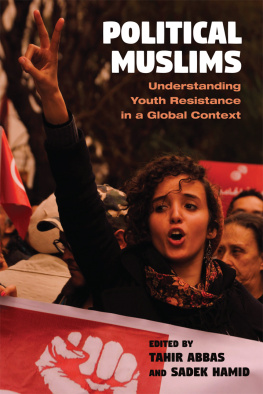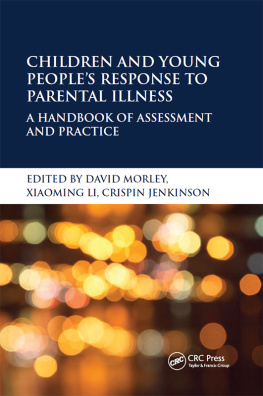Introduction
Children occupy a prominent position in human rights and development discourses, and antipoverty targets are often measured explicitly in indicators of child mortality, health, and education by the UN, the World Bank, and other development agencies. The UN Convention on the Rights of the Child (UNCRC), introduced in 1989 and rapidly ratified by all countries except the USA and Somalia, provides a framework of universally applicable standards for safeguarding childrens rights, while many of the Millennium Development Goal targets refer to childrens health, education, and welfare. However, concerns about child labor and young carers call into question the universality of global constructions of childhood and youth.
This chapter explores how the paid and unpaid care work that young people undertake in their everyday lives in many African societies intersects with wider debates about childrens rights, child labor, and child domestic work. Firstly, we give a brief overview of tensions in conceptualizing childrens rights in the African context and highlight key debates about child labor, child domestic work, and childrens familial responsibilities. We then examine the nature of childrens care work and consider how to define young caregiving and why this may be beneficial. We then explore the policy and practice implications of adopting differing perspectives on young caregiving, from a child protection/child labor abolitionist perspective to a young carer/child-centered rights perspective, drawing on empirical research with young people, families, and NGO and governmental stakeholders in East Africa. Through the lens of childrens rights, this chapter focuses on care, a theme that is also discussed in other contributions to the first section of this volume, as well as childhoods and youth in the global South, which are explored throughout the volume.
Defining Childrens Rights in Sub-Saharan Africa
The UN Convention provides a universal framework of rights to the provision, protection, and participation in the best interests of the child. While the global focus on childrens rights and, in particular, recognition of childrens rights to express their views in all matters affecting them (Article 12) have been welcomed, researchers have revealed how the Convention conflicts with sociocultural understandings of childhood and the lived realities of children and youth in the global South. The rights discourse promotes a universal model of childhood, based on Western ideals, that has become globalized through international development and human rights discourses and national policies (Boyden ). Western ideals of childhood are often based on notions of childrens innocence, vulnerability, and needs for education and socialization in preparation for their future adult lives. From this perspective, children need to be protected from adult responsibilities, exploitation, and harm; they should be cared for predominantly by parents within the family home and spend most of their time in full-time education, recreation, and play.
Such ideals of childhood bear little resemblance to the lives of children and youth in the global South, where many children are expected to contribute to the household economy from an early age, where the living arrangements of children are characterized by a diversity of household forms and where there is limited public social protection to prevent child poverty. Children who do not conform to these understandings of childhood are constructed as other and are perceived as the focus for rescue, rehabilitation, and intervention (Wells ). Researchers call for greater recognition of the plurality and diversity of global childhoods that are historically and geographically contingent.
Furthermore, the UNCRC is based on an individualized notion of the child, rather than recognizing the communal value systems of many societies in the global South and the ways that childrens lives are embedded in relationships with their families and communities. Boyden (). Similarly, while the Convention addresses child military service, which mostly affects boys, it fails to mention child marriage, which mostly affects girls.
Disenfranchisement with the universalist and individualistic nature of the UN rights discourse led to the establishment of African regional charters on human rights, such as the African Charter on Human and Peoples Rights (1981) and the African Charter on the Rights and Welfare of the Child (1990). Alongside identifying individual rights, these regional charters emphasize the sociocultural responsibilities of individuals to their families, communities, ethnic group, nation, and region. Many nongovernmental organizations working on childrens rights in East Africa also recognize childrens contributions to their families and communities, through their focus on childrens rights and responsibilities . Article 31, The Responsibility of the Child, of the African Charter on the Rights and Welfare of the Child (1990) states that, among other duties, the child, subject to his (sic) age and ability, shall have the duty to work for the cohesion of the family, to respect his parents, superiors and elders at all times and to assist them in case of need and to preserve and strengthen African cultural values in his relations with other members of the society, in the spirit of tolerance, dialogue and consultation and to contribute to the moral well-being of society. The African Charter also explicitly recognizes gender-specific concerns in the African context, such as girls right to education.

